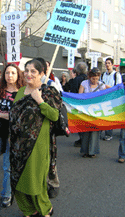Feature Archives
Tue Apr 19 2005
5/12: Screening of "Speak Out: I Had an Abortion"
“Speak Out: I had an abortion," a documentary by Jennifer Baumgardner and Gillian Aldrich, will be screened on May 12th from 7-9pm at 777 Valencia, between 19th and 20th at New College of California. This documentary features women speaking candidly about their experiences with abortion. “Speak Out” showcases the voices of the first generation of women whose reproductive rights were recognized and safeguarded by the US. This film was made as part of the larger "I had an abortion" campaign, which Jennifer started last year in response to what she sees as the attempt by the right to foist a false consciousness of regret, terror and sadness on women who have had abortions. "Speak Out: I had an abortion" gives voice to the truth that each woman’s unique experience with abortion can be supported and respected.
Elizabeth Creely writes, "On January 22, 2005, over 4,000 anti-choice protesters descended on San Francisco bearing the message that abortion hurts women. Women who have personally experienced their own abortion as a tragic mistake deserve to find support. However, their individual experiences should not be used to limit the rights of all women. Let's open up the dialogue and hear even more stories- about our bodies, our beliefs, and ourselves. After the screening, we will invite women who have had abortions to speak up and tell their abortion story publicly. Women who were born after the Roe Decision grew up in a unique moment in history when a woman's right to control her body was established. How do we feel about that?" Read more
This program is sponsored by New College’s Center for Education and Social Action and EXHALE, a woman’s counseling organization.
I'm Not Sorry.net Website | "I had an abortion" t-shirts seen as controversial
Elizabeth Creely writes, "On January 22, 2005, over 4,000 anti-choice protesters descended on San Francisco bearing the message that abortion hurts women. Women who have personally experienced their own abortion as a tragic mistake deserve to find support. However, their individual experiences should not be used to limit the rights of all women. Let's open up the dialogue and hear even more stories- about our bodies, our beliefs, and ourselves. After the screening, we will invite women who have had abortions to speak up and tell their abortion story publicly. Women who were born after the Roe Decision grew up in a unique moment in history when a woman's right to control her body was established. How do we feel about that?" Read more
This program is sponsored by New College’s Center for Education and Social Action and EXHALE, a woman’s counseling organization.
I'm Not Sorry.net Website | "I had an abortion" t-shirts seen as controversial
4/19 Update: Joseph Ratzinger was chosen to be the next Pope and will be called Pope Benedict XVI.
Pope John Paul II's death has left billions of people around the world mourning and anticipating what the next pontiff's priorities will be. Call To Action, a church reform group, stated, "We are hoping for a pope who forcefully spreads the message of peace and non-violence throughout the world in these troubled times as did Pope John Paul II... He may also need to distance himself from some of the positions taken by Pope John Paul II in order to deal with the important issues facing the institution...the next pope must take action regarding the priest shortage... We hope that the new pope recognizes the necessity of lifting the mandatory celibacy ban."
Call to Action has also called for creativity and academic feedom, and a new way to deal with the sexual abuse crisis. The organization says that women are called to the priesthood, and that this call should be heeded. Call to Action Statement The late Pope's position that "abstinence and fidelity within marriage, and not condoms, were the best way to stop the spread of HIV/AIDS" seems unrealistic to many. A policy that he advocated in his personal life was that all reasonable means should be used to prolong his life in case of illness. This position that was widely publicized during the Terri Shiavo scandal, but the pope's health declined rapidly in the last two weeks of his life, and he died just days after Shiavo did.
Many progressives have called for rallies to counter the "pope propaganda"-- some have called the late Karol Wojtyla, a.k.a. Pope John Paul II a reactionary. Among those believed to have a wide base of support for becoming the successor to Wojtyla is Cardinal Joseph Ratzinger, a German. Ratzinger opposes contraception and the use of condoms to combat HIV/AIDS. He advocates a diminished role for women in the Church and has called for mandatory celibacy for priests. Read more about Ratzinger
Some papal history | Matt Foreman of NGLTF on the Pope's Death | George Carlin on Religion | Story about the North American Pontifical College | Seniornude perspective | Indybay Story About Women and the Church
Pope John Paul II's death has left billions of people around the world mourning and anticipating what the next pontiff's priorities will be. Call To Action, a church reform group, stated, "We are hoping for a pope who forcefully spreads the message of peace and non-violence throughout the world in these troubled times as did Pope John Paul II... He may also need to distance himself from some of the positions taken by Pope John Paul II in order to deal with the important issues facing the institution...the next pope must take action regarding the priest shortage... We hope that the new pope recognizes the necessity of lifting the mandatory celibacy ban."
Call to Action has also called for creativity and academic feedom, and a new way to deal with the sexual abuse crisis. The organization says that women are called to the priesthood, and that this call should be heeded. Call to Action Statement The late Pope's position that "abstinence and fidelity within marriage, and not condoms, were the best way to stop the spread of HIV/AIDS" seems unrealistic to many. A policy that he advocated in his personal life was that all reasonable means should be used to prolong his life in case of illness. This position that was widely publicized during the Terri Shiavo scandal, but the pope's health declined rapidly in the last two weeks of his life, and he died just days after Shiavo did.
Many progressives have called for rallies to counter the "pope propaganda"-- some have called the late Karol Wojtyla, a.k.a. Pope John Paul II a reactionary. Among those believed to have a wide base of support for becoming the successor to Wojtyla is Cardinal Joseph Ratzinger, a German. Ratzinger opposes contraception and the use of condoms to combat HIV/AIDS. He advocates a diminished role for women in the Church and has called for mandatory celibacy for priests. Read more about Ratzinger
Some papal history | Matt Foreman of NGLTF on the Pope's Death | George Carlin on Religion | Story about the North American Pontifical College | Seniornude perspective | Indybay Story About Women and the Church
Wed Mar 16 2005
Indymedia Reporter Brings Independent Media to the Forest
Z, who is also known as Ellen, is an Indymedia reporter from Oregon. She reports that this past weekend, she went to Southern Oregon to interview women from the Sisiyou. These women conducted an action on Monday, March 16th in which they took over the only bridge that can be
used by log trucks to get to the forest to cut the old growth at the
Biscuit. (Indybay coverage of the Biscuit protests: 3/10 | 3/8 | 3/2 | 2/19
She said, "... women all over the world collaborating to take back the earth...Wow! I went to Southern Oregon this weekend and interviewed the women warriors of the Siskiyou...I taught the women how to post their media release of this morning's action to Portland Indymedia and did a mini-workshop on being the media and the Indymedia worldwide network. I told them that I talked to women from Europe and North America and we are with them in their actions to stop bush's war on the world.
"I interviewed a 72 year-old woman who was arrested last week because she blocked the bridge. She came back from jail and taught other local and regional women how to do direct action. The interview is below. There are pictures. There is power. There are women warriors needing our support. Bush wants to take ANWAR and the 850 year-old California Sequoias. He is destroying what is most sacred." Read the interview
Portland Indymedia Save the Biscuit Stories | Indybay's Forest and Environment Page
She said, "... women all over the world collaborating to take back the earth...Wow! I went to Southern Oregon this weekend and interviewed the women warriors of the Siskiyou...I taught the women how to post their media release of this morning's action to Portland Indymedia and did a mini-workshop on being the media and the Indymedia worldwide network. I told them that I talked to women from Europe and North America and we are with them in their actions to stop bush's war on the world.
"I interviewed a 72 year-old woman who was arrested last week because she blocked the bridge. She came back from jail and taught other local and regional women how to do direct action. The interview is below. There are pictures. There is power. There are women warriors needing our support. Bush wants to take ANWAR and the 850 year-old California Sequoias. He is destroying what is most sacred." Read the interview
Portland Indymedia Save the Biscuit Stories | Indybay's Forest and Environment Page
The United Nations Commission on the Status of Women has been holding its forty-ninth session. The February 28th-March 11th gathering has been held to review and appraise the Beijing Declaration and Platform for Action from the 23rd Special Session of the UN General Assembly. Read more The Beijing Declaration was adopted at the Fourth World Conference on Women in Beijing in 1995. In addition to the declaration review, the Commission planned this month to consider "Current challenges and forward-looking strategies for the advancement and empowerment of women and girls."
Days before the gathering was set to begin, the Bush administration signaled to other nations that it would not unequivocally reaffirm the commitments made by the United States to the world's women a decade ago. Over 30 organizations sent a letter to Secretary of State Condoleezza Rice to urge the Bush administration not to withdraw from the U.S. pledge made at the Beijing Women's Conference. Organizations issued a March 3rd statement to urge the US to stop blocking consensus about women's rights. During the gathering, the U.S. delegation had stalled consensus by offering language that specified that the Platform conferred no new international rights, including no right to abortion.
Two memorable comments by US delegate Ellen Sauerbrey: "We have stated clearly and on many occasions ... that we do not recognise abortion as a method of family planning, nor do we support abortion in our reproductive health assistance." She articulated US policy on Aids prevention for adolescents: "We emphasise the value of the ABC - abstinence, be faithful, and correct and consistent condom use where appropriate - approach in comprehensive strategies to combat the spread of HIV/Aids and the promotion of abstinence as the healthiest and most responsible choice for adolescents." Sauerbrey's statements were not well received. On March 2nd, Sauerbrey read a statement from Dr. Rice
Women's Environment and Development Organization | Women's eNews | United Nations Women Watch | More about Ellen Sauerbrey
Days before the gathering was set to begin, the Bush administration signaled to other nations that it would not unequivocally reaffirm the commitments made by the United States to the world's women a decade ago. Over 30 organizations sent a letter to Secretary of State Condoleezza Rice to urge the Bush administration not to withdraw from the U.S. pledge made at the Beijing Women's Conference. Organizations issued a March 3rd statement to urge the US to stop blocking consensus about women's rights. During the gathering, the U.S. delegation had stalled consensus by offering language that specified that the Platform conferred no new international rights, including no right to abortion.
Two memorable comments by US delegate Ellen Sauerbrey: "We have stated clearly and on many occasions ... that we do not recognise abortion as a method of family planning, nor do we support abortion in our reproductive health assistance." She articulated US policy on Aids prevention for adolescents: "We emphasise the value of the ABC - abstinence, be faithful, and correct and consistent condom use where appropriate - approach in comprehensive strategies to combat the spread of HIV/Aids and the promotion of abstinence as the healthiest and most responsible choice for adolescents." Sauerbrey's statements were not well received. On March 2nd, Sauerbrey read a statement from Dr. Rice
Women's Environment and Development Organization | Women's eNews | United Nations Women Watch | More about Ellen Sauerbrey
Fri Feb 25 2005
National Eating Disorders Week Observed in the Bay Area
National Eating Disorders Week will take place from February 27th through March 5th. Events are scheduled all over the Bay Area for that week.
Eating disorders cause immeasurable suffering for victims and families. They have reached epidemic levels in America, affecting all segments of society, young and old, rich and poor, all minorities, including African Americans and Latinos. Seven million women and one million men suffer from eating disorders. •Victims lose the ability to function effectively -- great personal loss and loss to society. 86% of people who have eating disorders report onset of illness by the age of 20, most during their late teens. Eating disorder prevention advocates say that awareness and prevention of these disorders is vital or the numbers will continue to grow.More info
National Eating Disorders Website | Voices Not Bodies 4/16 Demo in Washington, DC | National Association of Anorexia Nervosa and Associated Disorders | Eating Disorder Glossary | The Body Positive | Eating Disorders Coalition
Eating disorders cause immeasurable suffering for victims and families. They have reached epidemic levels in America, affecting all segments of society, young and old, rich and poor, all minorities, including African Americans and Latinos. Seven million women and one million men suffer from eating disorders. •Victims lose the ability to function effectively -- great personal loss and loss to society. 86% of people who have eating disorders report onset of illness by the age of 20, most during their late teens. Eating disorder prevention advocates say that awareness and prevention of these disorders is vital or the numbers will continue to grow.More info
National Eating Disorders Website | Voices Not Bodies 4/16 Demo in Washington, DC | National Association of Anorexia Nervosa and Associated Disorders | Eating Disorder Glossary | The Body Positive | Eating Disorders Coalition
Tue Feb 15 2005
Global Women's Strike Takes to the Streets on Int'l Women's Day
On March 8th, a Global Women's Strike took place in over 60 cities around the world. The San Francisco protest on that date started at 3pm at City Hall and marched to the SF City Jail
for a 4pm rally. Photos: 1 | 2
This year the Strike focused on demanding: "A Living Wage for All our Work & Pay Equity in the Global Market; End Poverty and War! Invest in Caring Not Killing!" More Demands of the Strike
The Global Women's Strike started in 2000 with women taking action together on or around March 8th. It has grown every year since, particularly in countries in the Global South. Men's support and participation internationally has been coordinated by Payday, a multiracial network of men, which is organizing with women and men who are Refusing to Kill: refusing the military and its lethal and repressive work, from the US and UK to Israel and Eritrea.
This year the Strike focused on demanding: "A Living Wage for All our Work & Pay Equity in the Global Market; End Poverty and War! Invest in Caring Not Killing!" More Demands of the Strike
The Global Women's Strike started in 2000 with women taking action together on or around March 8th. It has grown every year since, particularly in countries in the Global South. Men's support and participation internationally has been coordinated by Payday, a multiracial network of men, which is organizing with women and men who are Refusing to Kill: refusing the military and its lethal and repressive work, from the US and UK to Israel and Eritrea.
NARAL Pro-Choice America has started a campaign to try to work with the anti-choice movement towards a similar goal: fewer abortions. NARAL says, "What better way to end the debate
over abortion than by eliminating the reasons women seek abortion?"
The group is circulating a petition to organizations in the anti-choice movement, asking them to join a new campaign to reduce the need for abortion. Senator Harry Reid - who opposes a woman's right to choose - has offered a common-sense bill called the Prevention First Act, which would help reduce unintended pregnancies through better access to birth control. The Planned Parenthood Federation of America says that it would "expand access to family planning services, ensure comprehensive medically accurate sex education, end insurance discrimination against women, promote emergency contraception, especially for sexual assault survivors, reduce the rates of teen pregnancy and sexually transmitted infections and reduce the need for abortion among women of all ages." Read more
The group is circulating a petition to organizations in the anti-choice movement, asking them to join a new campaign to reduce the need for abortion. Senator Harry Reid - who opposes a woman's right to choose - has offered a common-sense bill called the Prevention First Act, which would help reduce unintended pregnancies through better access to birth control. The Planned Parenthood Federation of America says that it would "expand access to family planning services, ensure comprehensive medically accurate sex education, end insurance discrimination against women, promote emergency contraception, especially for sexual assault survivors, reduce the rates of teen pregnancy and sexually transmitted infections and reduce the need for abortion among women of all ages." Read more
Womyn:
 27
27









